NCE2第2课
NCE2-1 新概念二 第2课课件

I had a very good seat. 2. take/have a seat 坐下 take/have one’s seat 坐下 (有固定座位)
The play was very interesting.
3. play ① vt. 玩
play basketball
② vt. 播放 play music ③ n. 戏 4. interesting adj. 有意思的 (修饰物) interested adj. 感到有意思的 (修饰人) be interested in sth. 对......感兴趣
at the end of the road/meeting/class
13. bear = stand= put up with 容忍,忍受
I can’t bear you.
‘It’s none of your business,' the young man said rudely.
'This is a private conversation!'.
rudely /`ru:dli/ adv. 无礼地 粗鲁地
New words and expressions:
private /`praIvIt/ adj. 私人的
• conversation /kXnvE`seISEn/ n. 谈
话
• theatre /`TIEtE/
n. 剧场,戏院
• seat /si:t/ n. 座位 • play /pleI/ n. 戏 • loudly /`laudli/ adv. 大声地
• angry • angrily
/`Qngri/
adj.
生气的 adv. 生气地
新概念英语2第二课 NCE2_Lesson02

★ aunt n. 姑,姨,婶,舅妈
• 所有长一辈的女性都用这个称呼 • 男性则是uncle: 叔叔 • 他们的孩子:cousin 堂兄妹(不分男女) • cousin的孩子:nephew 外甥,侄子
niece 外甥女,侄女
★repeat v. 重复(=Pardon)
① vt. 重复 • 你能重复最后一个词吗? • Will you repeat the last word? • 跟著我念这些句子 • Repeat these sentences after me. ② vi. 重做,重说 • 她只是反覆地做同样的事 • She did nothing but repeated.
1、在肯定句中,它与表示持续性状态的动词连用,表示某动作持续到 某一时刻:
我会在这里等到5点钟。 I’ll wait here until 5. 直到他回来为止,他爸爸都是活着的. His father was alive until he came back. 2、在否定句中,它通常与描述短暂动作的动词连用,“直到……才”: 她到6点才能来。 She cannot arrive until 6. 直到他回来,他爸爸才死. His father didn't die until he came back.
★ring(rang. rung)
① vt. 鸣,(铃、电话等)响(往往是提醒人做某事) • 每天早上表都在六点钟响。 • Every morning the clock rings at 6. • 电话/门铃响了。 • The telephone(door bell) is ringing. ② vt. 打电话给(美语中用call) • 明天我会给你打电话 • Tomorrow I'll ring you. ③ n. (打)电话 give sb. a ring • 记得明天给我打电话 • Remember to give me a ring. /Remember to ring me. ④ n. 戒指 • 他给了她一个钻石戒指作为生日礼物 • He gives her a diamond ring as a birthday present.
NCE-2-lesson2

7."It's raining again."
又下雨了。 体现下雨、下雪、踢球、读书等动作多用进行时态。 It is snowing in great flakes. 正值大雪纷飞。
We are playing football on the street. 我们在街上踢球。
I am reading a letter now. 我正在第一封信。
He is leaving。他就要准备走了。
We are starting。我们准备开始了。
Most young people will be meeting the pop singers at the
airport。
大多数年轻人即将在机场迎接这些流行歌手。
11." But I'm still having breakfast," I said.
Jane is just dressing up. 简正在打扮。
Mrs. Smith is cooking now. 史密斯太太目前正在做饭。
一般目前时能够表达习惯性动作,往往与频度副词连用, 如often, always, sometimes, never等:
Do you often come here? 你常来这儿吗? Helen never writes to her brother Tony.
dinner正餐(多为晚餐);snack原指小吃,可指夜宵, meal广义上旳“餐”,没有时间限制。
3、Last Sunday I got up very late. 上周日我起得很晚。
(1)Last Sunday为前置时间状语,也能够放于句尾。 (2) 变化如下:
(3) I got up very late last Sunday. (4) 但时间状语前置更强调时间。 (2 )比较学习:
NCE2 Lesson 2

Lesson 2 单词讲解1. until prep. 直到……为止until lunchtimeI go to school until Friday.not … until 直到……才I’m not free until Friday.I didn’t get up until 10 o’clock this morning.2. outsideadj. 在外面的outside worldprep. 在…的外面outside the downtown arean. 外面; 外部He seems gentle on the outside.adv. 在外面Please wait outside.3. ringv. (铃、电话等)响; 打电话 The phone is ringing.I will ring you (up) later.n. 打电话; 戒指Give me a ring later.a wedding ring4. repeat v. 重复Pardon?Would you please repeat it?Would you please explain that word?Lesson 2 课文&语法讲解1. It was …表示时间:It’s 10 o’clock in the morning.表示天气:It’s snowing now.表示距离:It’s 2 kilometers to the store.确定人的身份:It’s Tim on the phone.2. I never get up early ...alwaysusually / often / frequentlysometimesseldomrarelyneverHelen rarely goes to the movies.3. … on Sunday s.on 表示在某一天on Mondayon Sept. 10on that daySundays 复数表示经常性的行为 I don’t go to work on Fridays.4. I sometimes stay …5. … stay in bed …表示卧床、睡觉时bed前不加冠词go to bedHe was sick in bed.6. …until lunchtime.until在肯定句中和表示持续性状态的动词连用表示动作持续到某时Wait until two o’clock in the afternoon.until在否定句和表示短暂动作的动词连用表示“直到…才”He didn’t come home until midnight.7. Last Sunday ...比较:on Sundaynext Saturdaythis Sundaylast Wednesday8. I looked out of ...look out of 朝…外看look out of the doorlook out 小心;注意Look out when you go across the street.9. It was dark ...It gets dark early in winter.10. “What a day!” …It is a terrible day.What + a / an + adj. + n. (名词单数) + 主语 + 谓语 +! What a terrible day it is!What + a / an + adj. + n. (名词单数) + 主语 + 谓语 +! He is a hardworking young man.What a hardworking young man he is!What a hardworking young man!They are hardworking young men.What + adj. + n. (可数名词复数) + 主语 + 谓语 +! What hardworking young men they are!We are enjoying delicious bread.What + adj. + n. (不可数名词) + 主语 + 谓语 +! What delicious bread we are enjoying!How + adj. / adv. + 主语 + 谓语 +! The movie is amazing.How amazing the movie is!He works hard.How hard he works!11. … the telephone rang.ring rang rungThe telephone is ringing.12. It was my …it 中性代词,指一物、一事、或一人It’s me.It’s the postman.13. “I’ve just arrived by train,” …by busby bikeby airby caron footWill’s car broke down and he had to return home on foot.14. I’m coming to see …瞬间动词用于现在进行时表示按计划、安排将来要发生的动作或状态come, go, arrive, leave …He’s leaving tomorrow.15. … I’m still having breakfast …零冠词have breakfasthave lunchhave dinner16. Dear me!My goodness!Oh, my god!Lesson 2 知识拓展(大学版)倒装:Not until … 直到…才Not until …,谓语助动词 + 主语 + 谓语动词Jane d idn’t send the email until she finished her lunch.Not until she finished her lunch did Jane send the email.强调结构It is / was not until + 时间从句或短语 + that + 主句部分Jane d idn’t send the email until she finished her lunch.It was not until she finished her lunch that Jane sent the email.比较:Not until she finished her lunch did Jane send the email.。
新概念英语第二册96篇课文翻译NCE2
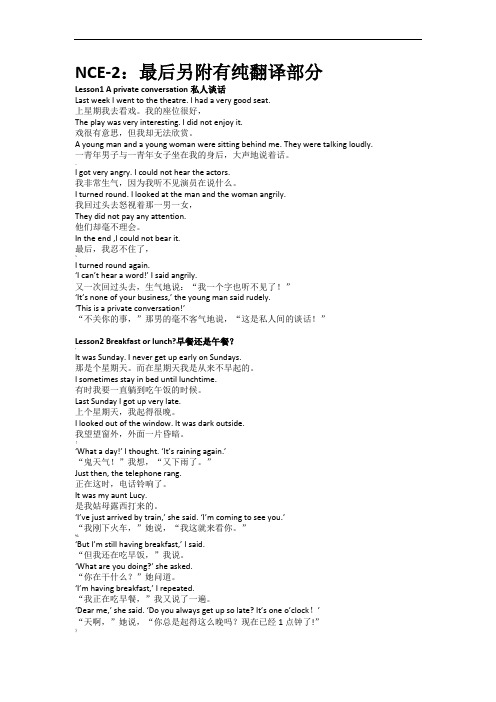
NCE-2:最后另附有纯翻译部分Lesson1 A private conversation私人谈话Last week I went to the theatre. I had a very good seat.上星期我去看戏。
我的座位很好,The play was very interesting. I did not enjoy it.戏很有意思,但我却无法欣赏。
A young man and a young woman were sitting behind me. They were talking loudly.一青年男子与一青年女子坐在我的身后,大声地说着话。
I got very angry. I could not hear the actors.我非常生气,因为我听不见演员在说什么。
I turned round. I looked at the man and the woman angrily.我回过头去怒视着那一男一女,They did not pay any attention.他们却毫不理会。
In the end ,I could not bear it.最后,我忍不住了,~I turned round again.‘I can’t hear a word!’ I said angrily.又一次回过头去,生气地说:“我一个字也听不见了!”‘It’s none of your business,’ the young man said rudely.‘This is a private conversation!’“不关你的事,”那男的毫不客气地说,“这是私人间的谈话!”Lesson2 Breakfast or lunch?早餐还是午餐?'It was Sunday. I never get up early on Sundays.那是个星期天。
而在星期天我是从来不早起的。
NCE2-2 Lesson35

Two points for each sentence
3. 几乎过了一个星期,那姑娘才能讲述自己 的遭遇。 • Nearly a week passed before the girl was able to explain what had happened to her. 4. 第二天当他醒来时,发现自己躺在医院里。 When she woke up a day later, she found herself in hospital.
rush v. 冲
① vi. 冲,奔 While I was talking to Frank, a man rushed into the room. ② vt.&vi. 仓促行事,仓促完成;赶紧做 Tom always rushes his homework on Sunday evenings. ③ n. 猛冲,奔 Roy made a rush at the thieves. rush out of 冲出
• be used to doing 习惯于做某事 • 我习惯于早起。 • I am used to getting up early.
2. A short while ago, however, he became a bus driver and he has not regretted it.
5.One of them was carrying a bag full of money.
• • • • • full of:装满 It’s full of water. It is filled with water. 我有个装满威士忌酒的瓶子。 I have a bottle full of whisky.
shortly soon, in a short time • shortly afterwards 不久以后:soon
NCE 第二册 Lesson 2 Lunch or breakfast

2.( )______! There is a danger ahead.
A. Look at B. Look out C. Look over
【New words 】
1
prep. 直到 adv. 外面 v. (铃、电话等)响
2
3
4
n. 姑,姨,婶,舅母
v. 重复
5
★until prep. 直到
until 用于 表示动作、 状态等的持 续,译为 “直到...为 止”或 “在……以 前”。
He did homework until 10 o’clock.
Because he is still having breakfast and it is already one o'clock.
Breakfast or Lunch
never It was Sunday. I (1)________ get up early on Sundays. I got sometimes (2)_____________stay in bed until lunch time. Last Sunday I (3)_________ What up very late. I looked out of the window. It was dark outside. ' (4)__________ rarining again.' Just then, the telephone rang. It a day!' I thought. 'It's (5)___________ by was my aunt Lucy. 'I've just arrived (6)_________ train,' she said. 'I'm coming (7)_____________ to see you.'
NCE2-2 Lesson 29 ppt

Listening
• 1. What is the ‘taxi’ in fact? • 2. What is it called? • 3. How many passengers can it carry? • 4. Has he ever landed on a roof?
Language Points
lonely adj.
• lonely adj. 孤单的, 人迹罕 见的 • alone adj. 单独的,独自的 • 我独自一人,但我并不孤独。 • I am alone but I am not lonely.
desert
[di’zə:t]
v 废弃,抛
弃 deserted
adj. 废弃的
a deserted house 一间废弃工厂 a deserted factory 一个废人 a disable man
5. 先行词同时包括人或物时,关系词用that.
The man and his dog that I always meet are standing by the gate.
-ed
•
a heart • a broken heart • a haert broken by me
• • • • • • •
be called 被称为 e.g. a ploughed field 被耕过的田 a deserted car park 被废弃的车场 written English 书面语 spoken English 口语
• Captain Ben Fawcett has bought an unusual taxi and has begun a new service. • un-: 前缀,不,未,非,反 • Eg: able—unable, happy-unhappy • lucky—unlucky
新概念英语第二册第二课教案
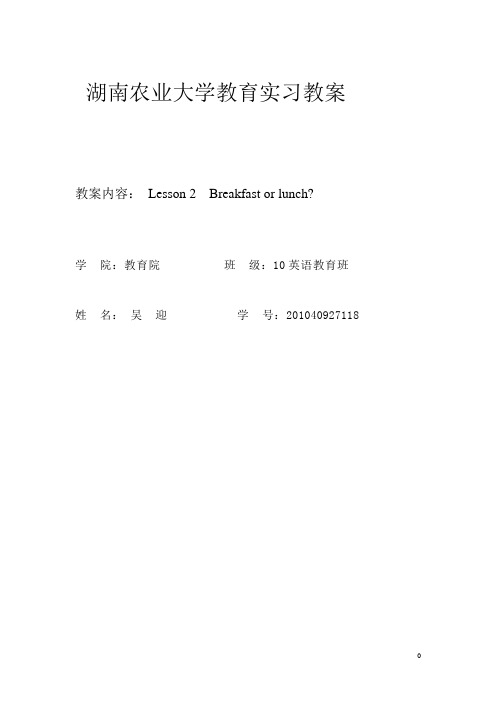
湖南农业大学教育实习教案教案内容:Lesson 2 Breakfast or lunch?学院:教育院班级:10英语教育班姓名:吴迎学号:201040927118Lesson 2 Breakfast or lunch?Teaching Aims and demands:1.Review the usage of Special Question.2.Master the usage of present continuous , and the word ―what‖.3.Grasp the following words and phrases:until, outside, ring, aunt, repeat, get up , stay, look out of, what a day, just then, by train, have breakfast,dear me.4.Learn a kind of word formation by adding affix —affixation5. Practice oral English with the topic ―A great breakfast I have at primary school/university‖.Teaching Content: Text ; Exercises (from Vocabulary to Writing)Teaching Key points and difficult points:1.the usage of present continuous.2.until, ring, repeat, get up, stay, look out of, just then, dear me.Teaching Periods: 6 periodsTeaching Procedures:Period 1-2:Ⅰ. Introduction to the text by asking some questions.Questions:1.Is it hard for you to get up early?2.Do you usually stay in bed very late?3.What time do you get up everyday?4.Do you usually have breakfast in lunchtime? Why?5.Do you remember your last brunch in school?6.Do you think it’s good for your health to have breakfast in lunchtime? Why?7.How do you usually make yourself have breakfast at the right time?8.Can you be an early bird for a month? ―Yes‖ or ― No‖?Ⅱ.Ask students to go through the text and finish the pre-class work to get the main idea of the text. Then analyze the text the general idea .Ⅲ. Explain the text in details.1. until prep. : up to the point in time or the event mentioned.e.g: Until she spoke I hadn’t realized she wasn’t English.You can stay on the bus until London (=until you reach London.)*from morning ~night.※ till (informal)1) conj./prep =untile.g. :Can’t you wait till we get home?2) n. the place were you pay for goods in a large shop/store.*a long queue at the tille.g. :Please pay at the till.3) v. (old use) to prepare and use land for growing crops.Usage Note:Till is generally felt to be more informal than until and is used much less often in writing. At the beginning of a sentence, until is usually used.2.outside1). adv. not in a room,building or container but on or to the outside of it. 在外面,向外面e.g. I’m seeing a patient ---please wait outside.It’s warm enough to eat outside.2) n. The outer side or surface of sth 外部e.g. I didn’t go into the temple---I only saw it from the outside.* At the ~ = at the moment = as a maximum* on the ~ :①Used to describe how sb appears or seemsOn the outside she seems calm, but I know she’s worried.②Not in prionLife on the outside took some getting used to again.3) adj./prep.She has a lot of outside interests (= not connected with her work)They fell cut off from the outside world.(=from other people and from other things that were happening) ~ chance of winning 胜算极小~of = apart frome.g. There was nothing they could do, outside of hoping things would get better.3.ring1) v. (rang, rung)~ sb. upI’ll ring you up later.~ sth. upShe rang up all the items on the till.~ for sth.Could you ring for a cab.~ (with sth.): to be full of a sound. 回想Applause rang through the hall.~ offHe rang off before I could explain.2) n.①give sb a ~: to make a telephone call to sb.E.g. I’ll give you a ring tomorrow.have a ~ of truth 真实可信E.g. His explanation has a ring of truth about it.②circleA key ~E.g. The children sat on the floor in a ring.③JewelleryE.g. A diamond glittered on her ring finger.4 .aunt : the sister of your father or mother; the wife of your uncle.E.g. My aunt lives in Canada.Auntie (= aunty ):Auntie Mary.5.repeat v.1) say/write again.To ~ a question.Do say if I’m repeating myself (=if I have already said this).He’s fond of repeating that the company’s success is all down to him.2) do againThey are hoping to repeat last year’s victory.To ~the class /year/grade(=in a school, to take the class/ year /grade again)重修这门课;重读一年;留级3)happen againHistory has a strange way of repeating itself.Repeatable adj. (usually in negative sentences)Repeated adj. (happening, said or done many times)~ absences from work.Repeatedly adv.E.g. The victim had been stabbed repeatedly in the chest.6 . get up: to stand up after sitting, lying, ect. ; to get out of bed.E.g. The class got up when the teacher came in.Could you get me up at 6:30 tomorrow.7.Stay1) stay in : to not go out or to remain indoorsE.g. I feel like staying in tonight.2)stay up : to go to bed later than usual.E.g. You’ve got school tomorrow. I don’t want you staying up late.3) stay away (from sb /sth): to not go near a particular person or place.E.g. I want you to stay away from my daughter.8.lookE.g. The teacher told us to look at the blackboard.That looks like an interesting film.Glance: take a quick look.E.g. She glanced at her watch during the talk.Gaze :a long steady look at sb/sth.E.g. She felt embarrassed under his steady gaze.Glare : a long angry look at sb/sth.E.g. The old woman glared at him9.Just then: at the momentE.g. Just then, someone knocked at the front door.Just then, my girlfriend drove up and gave me a ride.10.Dear me: used in expression that show that you are surprised, upset, annoyed or worried.E.g. Dear me! What a mess!Dear oh dear! What are you going to do now?11.What a day! =what a day it is ! =>elliptical sentenceE.g. This is a beautiful picture.= What a beautiful picture.She is careless. = How careless she is.12.I’m comeing to see you.Be +Ving +to : used to show that sth is likely to happen very soon or in the future.E.g. I think I’m going to faint.Look at these black clouds--- it is going to rain.15. Word formation-----affixationAdv. –ly(the suffix –ly ,from Middle English, is added to adjectives to form adverbs.)adj. Adv.repeated repeatedlylate latelyPeriod 3-4Ⅳ. Do some oral practice.1.Ask students to retell the story based on the following questions by using theexpressions in the text.Questions concerned:a. Does the writer always get up early on Sunday, or does he always get up late?b.Did he get up early last Sunday, or did he get up late?c.Who telephoned then?d. Had she just arrived by train, or had she come on foot?e.Did he say,’ I’m still having breakfast’, or did he say ,’ I am still in bed’?f.Was his aunt very surprised or not?g.What was the time?2.Topic: A great breakfast I have at primary school/universityExpressions for reference:(great,campus, delicious, roommates, cheap, etc.)(unforgettable, amusing, surprised, various, etc.)Ⅴ. WritingAsk students to write a summary about this text in not more than 55 words.Ⅵ. ConclusionAsk some students to read their summaries and evaluate the best one. Analyze the reasons why his/hers is the excellent.(talk about the skills)Period 5-6Ⅶ. Do some exercises in class and check the answers.1. When Aunt Lucy telephoned _____.A.the writer was asleep.B. the writer was still in bed.C. the writer had already got up.D. the writer was having lunch.2. Aunt Lucy was surprised because_____.A. the writer was having lunch.B. it was one o’clock.C. it was late.D.the writer was having breakfast at lunchtime.3. Write these sentences again. Each sentences must begin with what.a. This is a wonderful garden!b. This is a surprise!c. He is causing a lot of trouble.d. They are wonderful actors!e. She is a hare-working woman.f. You are a clever boy.4. Give the correct form of the words in parentheses.a. he is still _______(sleep).b. It (begin) to rain before she took a taxi.c. When all the guests had left, Derek (arrive).Ⅷ.Assignments :1. Structure& V ocabulary : P192. Writing: An unforgotten day in school.。
新概念英语NCE2_Lesson02课件

Notes on the text
• What a day? • What + a + n.——感叹句 • It is a terrible day.==> What a
terrible day! 省略 : 1.主、谓随时可省 what a good girl (she is)! what a good girl (she is)! 2.省形容词 What a day!
发生) • Often , Always——一般现在时 • “现阶段”:I am working as a teacher. • 频率副词往往放在句子中间, 实义动词前, 非实义动词后 • 如果既有实义动词又有非实义动词, 要放在两个之间. • 疑问句中副词往往放在主语后面. • 非实义动词 : • 1.系动词(be) 2.助动词帮助动词构成时态的(do, does, will, shall, have,
• It was Sunday. I never get up early on Sundays. I sometimes stay in bed until lunchtime. Last Sunday I got up very late. I looked out of the window. It was dark outside. 'What a day!' I thought. 'It's raining again.' Just then, the telephone rang. It was my aunt Lucy. 'I've just arrived by train,' she said. 'I'm coming to see you.'
NCE2第2课件
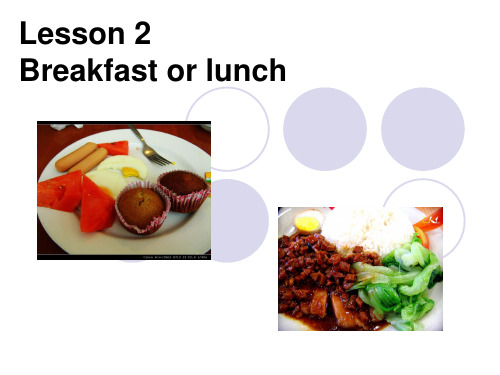
Lesson 2 Breakfast or lunch
New words and expressions
until 直到... outside 在...外面 ring vi.响 (rang-rung) aunt 姑姑;婶婶;舅妈;阿姨 repeat vt.重复
It was Sunday. I never get up early on Sundays. I sometimes stay in bed until lunchtime. Last Sunday I got up very late.
I looked out of the window. It was dark outside. 'What a day!' I thought. 'It's raining again.' Just then, the telephone rang.
It was my aunt Lucy. 'I've just arrived by train,' she said. 'I'm coming to see you.' 'But I'm still having breakfast,' I said. 'What are you doing?' she asked. 'I'm having breakfast,' I repeated. 'Dear me,' she said. 'Do you always get up so late? It's one o'clock!'
新概念二册第二课笔记

NCE II Lesson 2一、单词及词组1. untiluntil的后面可以接具体的时间(此时为介词prep.),也可以接一个时间状语从句(此时为连词,conj.)。
它既可以用于肯定句中,又可以用于否定句中,但用法不同。
(一)、用于肯定句中,意思是“到、、、为止”,表示动作一直持续到表示的时间为止。
主句的动词必须是延续性动词。
I will wait here until half past four.He worked in the office until his wife came in.(二)、后面的从句中不能用将来时,如果要表示将来的动作或状态,则用一般现在时代替(主将从现)。
He will stay here until his mother comes back.They will study at the school until their parents come to take them home.(三)、until用于否定句中,意思是“直到、、、才”,表示动作从until表示的时间才开始,主句动词延续性、非延续性均可。
I didn’t go to bed until 12 last night. I won’t come back until my mother ask s me.He doesn’t do his homework until his father come s back every day.He didn’t go to bed until his mother came back.2. outside prep. 在…外面Lucy and Mary were playing outside the classroom when I came.adv. 在外面(后不接名词,修饰一句话或动词) He stood outside when Lucy watched TV.It is cold outside in winter.3. ring 名词n. [C] (1).圈;环;环形物Watching much TV brings dark rings around her eyes.(2).戒指;耳环Lucy bought a pair of rings yesterday.vi. (1) (钟、铃等)鸣,响I was making the bed when the telephone rang.vt. (1).按(铃);摇(铃);敲(钟) She felt bad and rang the bedside bell for a nurse.(2).打电话给[ sb. (+up)] =telephone/phone vt. Your wife has rung you twice since lunch time.I'll ring you up when you get home.4. repeat vt. 重复(说,做)I repeated,‘Lucy is a good girl.’You must repeat your homework because your handwriting is terrible.5. dark adj. (1) 暗;黑暗的It's getting dark. 天快黑了。
新概念英语第二册第2课NCE 2 Lesson 2

I sometimes stay in bed until lunchtime. Sometimes he comes by train and sometimes by car. 银行直到6点才关门。 The bank is open until 6 o‟clock. The rain didn‟t stop until evening.
‟What a day!‟ I thought. What an awful/nice day! 完整的句子’What a day it is!„ 构成:what+名词(名词短语)+主语+谓语+! It‟s raining again.
P3每句欣赏(s9-s12)
just now Just then, the telephone rang.
现在进行时
What a day! what和how引导
What +名词(名词短语)主语+谓语+! What a nice girl she is ! What an interesting book!
How +形容词/副词(短语)+主语+谓语! How nice the girl is! How interesting the book is!
P2每句欣赏(s4-s8)
get up early
last Sunday I got up very late.
I looked out of the window. look out of 从…外看 Don‟t look out of the window.
It was dark outside. inside
2019教育NCE2-新概念二Lesson2课件(共40张)精品英语

be going to….. 表将来
It is going to rain. I’m going to have lunch. ……
What are you going to do?
四中入学试题 Dianna was going out of the shop_____she ran
into an old man who______. A. when, had come B. as, had come C. when, was coming D. after, comes
1.What was the weather like last Sunday?
2.Who was coming to see the writer?
3.How did the writer’s aunt come?
4.Why was she surprised?
What a day! =What a bad day!
How often do you read your English book?
Everyday? Twice a week? Five times a week? …
never
seldom
sometimes
often usually
always
I ______ get up at…… never
(直到…为止,在…以前 ) Don’t open it until your birthday. She didn’t sleep until eight. (直到…才)
New words and expressions
outside adv. 外面
out side
[au]
反义:
新概念英语第二册96篇课文翻译NCE2
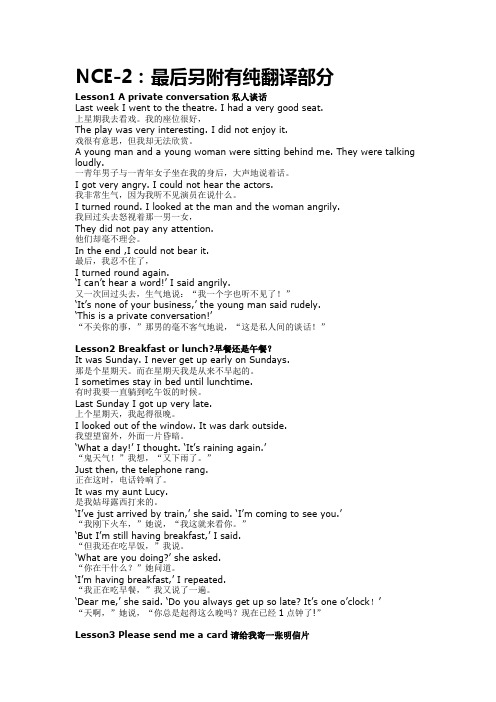
NCE-2:最后另附有纯翻译部分Lesson1 A private conversation私人谈话Last week I went to the theatre. I had a very good seat.上星期我去看戏。
我的座位很好,The play was very interesting. I did not enjoy it.戏很有意思,但我却无法欣赏。
A young man and a young woman were sitting behind me. They were talking loudly.一青年男子与一青年女子坐在我的身后,大声地说着话。
I got very angry. I could not hear the actors.我非常生气,因为我听不见演员在说什么。
I turned round. I looked at the man and the woman angrily.我回过头去怒视着那一男一女,They did not pay any attention.他们却毫不理会。
In the end ,I could not bear it.最后,我忍不住了,I turned round again.‘I can’t hear a word!’ I said angrily.又一次回过头去,生气地说:“我一个字也听不见了!”‘It’s none of your business,’ the young man said rudely.‘This is a private conversation!’“不关你的事,”那男的毫不客气地说,“这是私人间的谈话!”Lesson2 Breakfast or lunch?早餐还是午餐?It was Sunday. I never get up early on Sundays.那是个星期天。
而在星期天我是从来不早起的。
I sometimes stay in bed until lunchtime.有时我要一直躺到吃午饭的时候。
新概念英语NCE2_Lesson02(共12页)课件
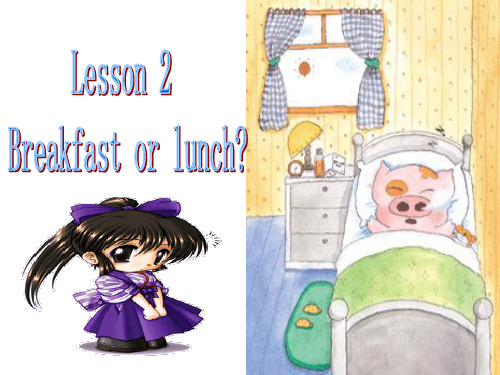
•1、书籍是朋友,虽然没有热情,但是非常忠实。2022年3月24日星期四2022/3/242022/3/242022/3/24 •2、科学的灵感,决不是坐等可以等来的。如果说,科学上的发现有什么偶然的机遇的话,那么这种‘偶然的机遇’只能给那些学有素养的人,给那些善于独 立思考的人,给那些具有锲而不舍的人。2022年3月2022/3/242022/3/242022/3/243/24/2022 •3、书籍—通过心灵观察世界的窗口.住宅里没有书,犹如房间里没有窗户。2022/3/242022/3/24March 24, 2022
谢谢观赏
You made my day!
我们,还在路上……
Tomorrow I'll ring you.
call/phone sb. (美式)
• 打电话(名) : give sb. a ring
Remember to give me a ring.
• ★ring n. 戒指
diamond ring 钻戒
Text
• never: 从来不 (可以直接用在动词前面) =not (前面一定要加助动词do,be)
He is leaving.
The plane is landing.
Cold!
感叹句的结构
what +(a/an)+形容词+名词+主语+谓语 what + 形容词+名词+主语+谓语
how +形容词+主语+谓语 how+副词+主语+谓语
陈述句变感叹句
陈述句变感叹句之妙法:“一断、二添、三换 位”
我们直到午夜才跳舞。
My grandma _____ sleep _____ I came back.
NCE2-2

get up • go to bed • go to sleep → fall asleep • stay up late
Language points
I never get up early on Sundays.
early: adj/adv • an early moring • The early bird catches the worm. 捷足先登 • I got up early this moring.
Key structures
• 感叹句 • 一般现在时
NCE II Lesson2

• 3) early反义词:lately get up lately
2.I sometimes stay in bed until lunch time.
Last Sunday I got up very late. I got up very late last Sunday.
如:do---does; miss---misses; fix---fixes; watch---watches; wash---washes;
c.
以辅y结尾的动词将y变i,再加-es,如:study---studies
d.
特殊变化,如:have---has
用法:
a.
表示经常性的动作或习惯性的动作,常与表示频率的时间状语连
• a diamond ring
rung[rʌŋ] )
4.aunt n.姑,姨,婶,舅妈 (所有长一辈的女性都用这个称呼)
男性则是uncle: 叔叔
他们的孩子 : cousin : 堂兄妹(不分男女) nephew [ 'nefju ] : 外甥, niece [niːs]外甥女
5.repeat [rɪ'pi:t] v. 重复
'But I'm still having breakfast,' I said. 'What are you doing?' she asked. 'I'm having breakfast,' I repeated. 'Dear me,' she said. 'Do you always get up so late? It's one o'clock!'
- 1、下载文档前请自行甄别文档内容的完整性,平台不提供额外的编辑、内容补充、找答案等附加服务。
- 2、"仅部分预览"的文档,不可在线预览部分如存在完整性等问题,可反馈申请退款(可完整预览的文档不适用该条件!)。
- 3、如文档侵犯您的权益,请联系客服反馈,我们会尽快为您处理(人工客服工作时间:9:00-18:30)。
Lesson 2 Breakfast or Lunch
教学步骤
第一节课:复习课(45分钟)
1第1课单词与词组复习
●方法一:单词与词组分开复习
单词复习如:单点或集体比赛等
词组复习如:进行造句或编故事比赛等
●方法二:单词和词组一起复习
1)在墙上写上中心词theatre
2)学生说单词与词组
先让学生说出与theatre有关的课文中的单词和词组;再发挥想像说出与theatre有关但不是课文上的单词或词组;教师同时在黑板上写上部分单词和词组,写上黑板的单词和词组以课文中与学生不是最熟悉的为主。
3)单词和词组朗读复习
4)单词和词组运用,如造句比赛或编故事比赛等
2听写
3规定过去时和过去分词复习
1)口头操练
2)笔头测试,如3-5分钟的小测试,测完马上收回,待下次批好后再给学生,可以与相关积分奖励挂钩起来;
4简单陈述句语序的复习
1)回忆:老师通过示范让学生回忆起6部分的顺序;
2)排序操练:如把6部分打乱,由学生上来进行排序比赛;
3)运用:如小组比赛,老师给出其中一部分,如只给出谓语,让学生分组进行讨论,将其他五部分添加后进行造句比赛。
第二节课:新课(45分钟)
1口语讨论(导入新课)
1)对比不同国家如中国/美国/英国早餐的不一样;
2)日常生活或起居时间讨论:如什么时候起床或睡觉?早中晚饭吃什么?
2单词教授
3目标听力
4课文模仿
5下划词组并check
6完成摘要写作
第三节课:新课(40分钟)
1一般现在时复习
1)标志词位置复习并完成18页B练习
2)一般现在时肯定句/否定句/疑问句等复习,并完成配套练习2感叹句
1)口头操练区分what/how
2)笔头练习巩固
319页上选择练习题完成
4背诵表演。
